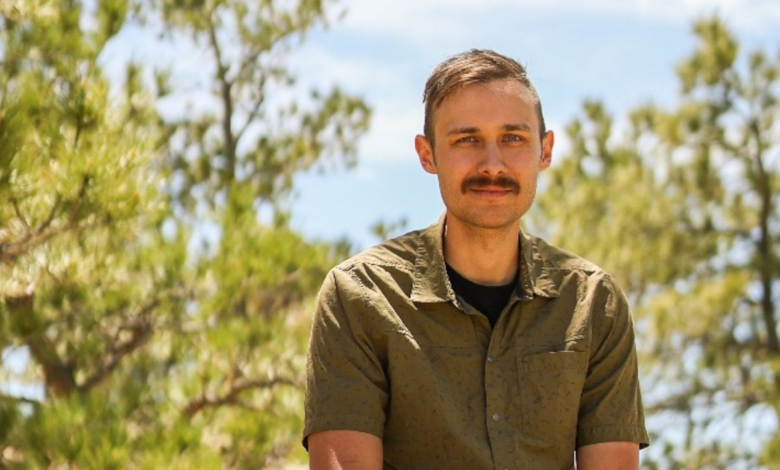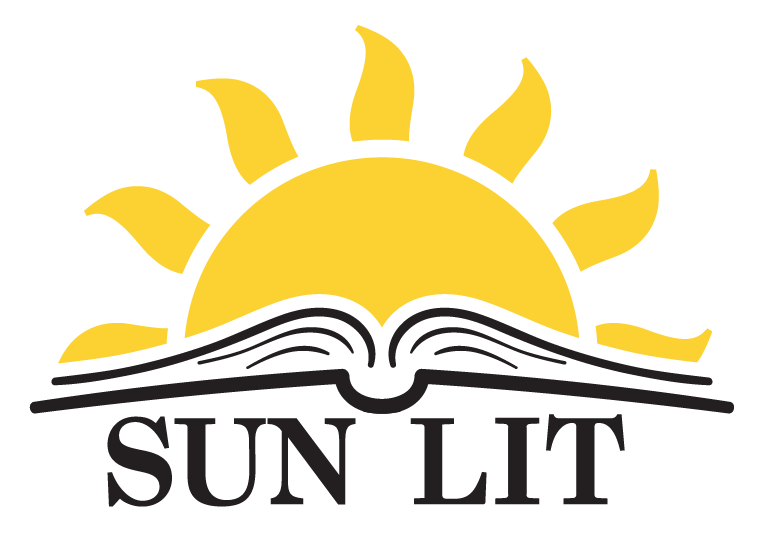Parenthood ignited Ian Patterson’s writing on broken health care

Ian Patterson has dreamed of being an author for decades, but finally began the journey with the birth of his first daughter. This is an objectively terrible time to start work that requires quiet concentration, and he knows it, but he loves the chaos nonetheless. He has lived in various places along the Colorado Front Range for the past 25 years, and currently resides in Colorado Springs with his family.
SunLit: Tell us this book’s backstory – what’s it about and what inspired you to write it?
Ian Patterson: I was listening to a podcast called “Writing Excuses,” which is phenomenal by the way, and they suggested imagining a world where you changed one thing, and like a thought experiment, followed that thread to see what else changed with it.
UNDERWRITTEN BY
Each week, The Colorado Sun and Colorado Humanities & Center For The Book feature an excerpt from a Colorado book and an interview with the author. Explore the SunLit archives at coloradosun.com/sunlit.
At the time, we were going through the first sick season with our daughter, who had just started daycare. It felt like we had a new virus every two weeks, and watching her go through them was terrifying, at times heartbreaking, and usually exhausting. When her symptoms got bad enough, we were spending time in the children’s emergency room, because we’re new parents and didn’t want to risk anything, and that’s the only real option for after-hours care where we live.
So given that framing, it’s probably not too surprising that I imagined a world where diseases could be transferred. And it’s no great stretch to see why it became a dystopian novel. Anyone who’s spent enough time in our health care system can attest to that.
SunLit: Place the excerpt you selected in context. How does it fit into the book as a whole and why did you select it?
Patterson: I selected the opening of the book because I think it does the best job of bringing the reader into the story. With this novel, I wanted to create an expanding world that was continually disorienting for the protagonist, and I think starting with a medically-induced coma does a great job at setting those expectations.
“Transference”
Where to find it:

SunLit present new excerpts from some of the best Colorado authors that not only spin engaging narratives but also illuminate who we are as a community. Read more.
Although I like some excerpts from later on more, there are a lot of things revealed throughout the narrative, and I didn’t want to give away any of the fun.
SunLit: What influences and/or experiences informed the project before you sat down to write?
Patterson: I’ve spent a fair amount of time in hospitals for someone my age. My mom was a nurse, so I was always around it. She first got cancer in 2010, and it came back 10 years later and took her in 2020. I was with her at the end, singing Simon and Garfunkel as she faded.
I vividly remember the oncologist telling me, when he thought briefly that her second round had gone into remission, “This will almost certainly be what kills her, eventually.” And he was right. I watched her get ravaged by medical bills and debt at the same time as the cancer ate her, and you really can’t help but hate that we chose to make the world this way when you go through that.
Around the same time, I went through two fairly extreme injuries that needed multiple surgeries to correct. By 35, I’d gone under anesthesia enough times to know the names of the drugs, and which ones I was more responsive to. Which is to say, I also did my time in the medical industrial complex. And beyond that, I’d spent a lot of my young adult life reading philosophy, science fiction, and political science to have a pretty good idea that it didn’t have to be this way. So I set out to critique it all.
SunLit: What did the process of writing this book add to your knowledge and understanding of your craft and/or the subject matter?
Patterson: In short, it got me started on everything. When I started on my first draft, I’d been writing regularly for three months. There had been fits and starts at other times in my life, but this one seemed to be sticking. Something about my mom dying, and the birth of my daughter, had enforced this feeling of mortality. It felt like I had a real deadline to work toward.
I was finding my voice as I wrote, and living in these great throes of creativity, and reading about style and structure and pacing and character arcs all at the same time. Once that draft was done, I asked my wife if “it was total shit and I should can it,” and she told me it wasn’t.
So I invested more time to learn all of the things involved in self-publishing. I went through nine months of editing and revisions, and learned how to hire editors and cover designers and plan a book launch.
Writing this book was my springboard into being a writer.
SunLit: What were the biggest challenges you faced in writing this book?
Patterson: Honestly, my time was the biggest one. I finally started writing when our daughter was born in 2023, and on top of raising a small human, I also work full time, and compete at a fairly high level in endurance cycling events. In order to maintain all that, my writing block is from 4-5 a.m. every day, which still gives me enough time to exercise before our daughter wakes up. That’s when it goes according to plan, which it frequently doesn’t!
Beyond that, not only was I writing while actively learning how to write well, but I was also starting to learn about self-publishing, editing, cover design, marketing, and building an audience at the same time. It was a very wild period with a lot of task switching.
SunLit: What do you want readers to take from this book?
Patterson: Although exaggerated, the mechanisms at work in this world are meant to mirror our own in the United States. Capitalism creates the conditions that allow some to flourish at the expense of others, and sells us the narrative that this is entirely based on merit of the individual, and not the conditions they were born into.
With each passing decade comes growing stratification, socio-economic divide, and a firmer barrier to ascending this class structure. This all has real impacts on health, life expectancy, and quality of life. And yet, it is considered taboo by many to question it.
If the organization of a society can be judged by its ability to reduce suffering, ours does not get passing marks. Just like the world represented in “Transference,” we have made peace with bargaining the hardship of some for the prosperity of others. I hope my book makes readers question that.
I also hope that readers enjoy the action, pacing, and style of a classic sci-fi tale that’s been compared to everything from “The Twilight Zone” to “Red Rising.”
SunLit: In what ways do people in your life bargain sickness, defined loosely here, for economic survival?
Patterson: There are many examples of this that I see, and others I’ve heard from readers along the way. From working multiple jobs to make ends meet, coal mining in Kentucky, working manual labor jobs with inadequate PPE or safety standards, to being forced to stay at a job you hate. These are the constant conditions of our economic structure, the most vulnerable among us have always had to bear the brunt of it, and although we put laws in place to protect workers, our system is at its core exploitative. It is intentionally meant to build a hierarchy. I am constantly struck by the fact that it doesn’t have to be this way.
SunLit: Tell us about your next project.
Patterson: Which one! I’m working to complete the Narrator cycle, with the sequel to “Transcendence” having been released May 20. There will be two more books in this universe, a prequel that I’m currently editing, and a final sequel that I’ve just started drafting.
In the background I’m also writing more literary leaning speculative fiction with a goal of traditionally publishing them. If you’re an agent, I’d love to chat with you!
A few more quick items
Currently on your nightstand for recreational reading: “The City and Its Uncertain Walls” by Haruki Murakami
First book you remember really making an impression on you as a kid: So many come to mind! “Redwall” by Brian Jacques was one of my first great obsessions with a series.
Best writing advice you’ve ever received: Worry about if it’s any good later, or maybe never, just write it down now, and then keep writing. Creating art is a joy in itself.
Favorite fictional literary character: Right now, I’ll say Gideon Nav from “The Locked Tomb” series by Tamsyn Muir. Whenever I’m writing snarky banter, I try to channel her.
Literary guilty pleasure (title or genre): John le Carré’s novels. The spy ones, the political ones, even the new ones that his son is writing. All of them.
Digital, print or audio – favorite medium to consume literature: Right now, it’s audio. I’ve had a lifelong love affair with print books, but it is so much easier to integrate reading into my life right now if I can do it while cooking, driving, or riding my bike. Plus, I love the musicality and rhythm of language, and I think hearing it spoken helps us be better writers.
One book you’ve read multiple times: For several years, I read “House of Leaves” by Mark Z. Danielewski at the start of autumn. I have a heavily used copy that the author signed for me. I really cherish it.
Other than writing utensils, one thing you must have within reach when you write: Headphones. All my writing is done to music, and I even change up albums based on what’s happening in the scene.
Best antidote for writer’s block: I’m a believer in free-form writing. If I’m really hung up, spending 5 minutes at the start of my session just hand-writing nonsense really seems to help.
Most valuable beta reader: My wife, Angie. Honestly though, she’s more of an alpha reader — she helps me brainstorm how to get out of plot holes, she’s honest when she doesn’t like something, and she’s also a huge cheerleader. She reads a ton and has a great feel for storyline and character, so it’s always really helpful feedback.
Source link

